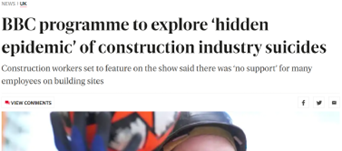
Two people working in construction in the UK die by suicide every working day. (The Lighthouse Club, 2024).
The Office for National Statistics unfortunately continues to show an increase in deaths by suicide in the construction industry - Suicide by occupation, England - Office for National Statistics (ons.gov.uk). Those working in construction are nearly four times more likely to take their own life when compared to other industries. Over 87% of the construction workforce are male and over 50% of the sector is made up of self-employed, agency staff or zero hour contract workers. Financial insecurity is a major factor for poor wellbeing – an issue that is very real for many people in current times.
The impact of poor mental health in the construction industry
A report by The Chartered Institute of Building (2020) found that 26% of construction industry workers thought about taking their own lives in 2019 - Mental Health and Wellbeing | CIOB. 48% of those workers who have died by suicide had taken time off work due to unmanageable stress – representing a devastating missed opportunity for support (Mates in Mind, 2022). These figures are also pre-pandemic and pre-cost of living crisis which are likely to have a further significant impact.
These devastating statistics reveal the importance of health & safety in the workplace and how the industry requires urgent and sustained changes to workplace cultures and norms (HR News, 2021).
There is increasing recognition of the mental health challenges prevalent in the workplace – estimated to cost the UK economy £26 billion a year and 400,000 workdays lost annually (Janusonyte et al., 2019 - Evaluating the impact of Mental Health First Aid (MHFA) training for UK construction workers — ResearchOnline (gcu.ac.uk)) These figures indicate that there are major mental health problems within the industry, which are proving difficult to combat because of the associated stigma (Campbell and Gunning, 2020). A study by The Lancet (2018) found that three-quarters of construction workers surveyed did not believe that employers yet recognized the early signs of mental illness.
The challenges of protecting mental health in construction
Construction workers are known to be a hard-to-reach group for mental health and wellbeing support and therefore opportunities must be available to support from the inside. Creating an environment in which employees feel comfortable talking about mental health is essential (The Lancet, 2018).
How to maintain mental health in the workplace
Health in Construction recommend:
Demonstration of senior level buy-in
Accountability – companies should demonstrate that an action plan is in place
Employee mental health champions
Raising awareness about mental health
A mental health policy in the workplace
Encourage disclosure
Equip line managers with the skills to have these supportive conversations
Provide information about support available
Recent years have seen many companies invest time and resources to better support the well-being of the workforce. However, there is still a long way to go.
Haswell Training delivers a range of Mental Health courses, follow the link for more information Level 3 Mental Health First Aid in the Workplace | Haswell Training

About the author: Charmaine Chandler
Charmaine is our Senior Quality Assurance Manager & Head of Wellbeing being a qualified Occupational Therapist registered with the Health and Care Professions Council bringing 14 years experience to the team.
View Charmaine Chandler's full bioBook in a free meeting with our wellbeing lead who can visit you and your team in person or via M...
This page aims to provide you with some clarity and options to support you in making that step. ...
Those working in construction are nearly four times more likely to take their own life when compa...
Here we will explore what asbestos is, what a Category A Asbestos Awareness Course entails (https...
Our aim is to share a weekly blog exploring all things Haswell and training related.